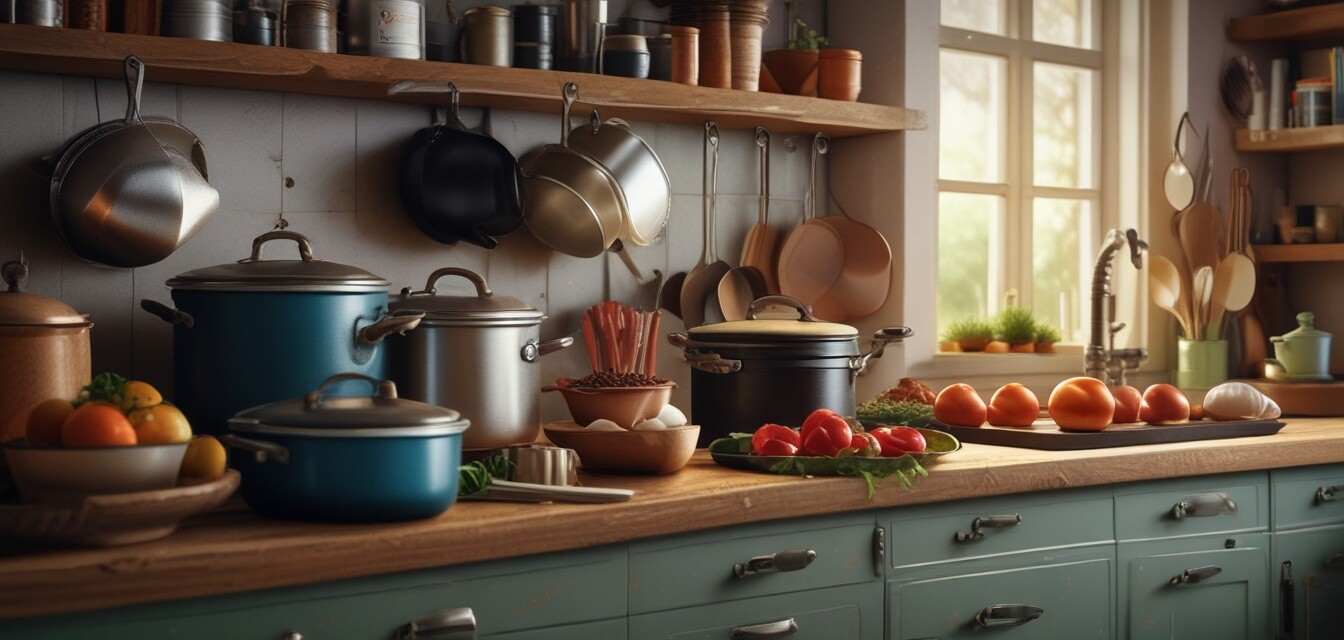
Disclosure: The FTC requires that this article indicate that it was created using AI and is not based on personal experience. It includes affiliate links, which means we may earn a commission if you purchase through these links at no extra cost to you. As Amazon Associates, we earn from qualifying purchases. Product recommendations and endorsements were generated by AI and do not reflect personal opinions or real-world use.
Mastering Bulk Cooking: Techniques for Beginners
Key Takeaways
- Understand the importance of meal planning before bulk cooking.
- Choose the right equipment and cooking methods for efficiency.
- Use proper storage techniques to maintain food quality.
- Consider portion sizes when cooking for a group.
- Enhance your food presentation to create enjoyable dining experiences.
Cooking for groups can be a daunting task for beginners, especially when it comes to bulk cooking. This guide will walk you through essential techniques and tips that will make your bulk cooking endeavors successful and enjoyable. By mastering these methods, you can ensure every meal is perfectly prepared and served with confidence.
Meal Planning Basics
Before you even turn on the stove, it’s essential to create a solid meal plan. This will help streamline your cooking process and save you time in the kitchen. Here are some steps to consider:
- Set a Menu: Decide what meals you'll be preparing for the week or event. Make sure to consider dietary restrictions and preferences.
- Calculate Portions: Estimate serving sizes by consulting portioning guidelines. This ensures that you prepare enough food without excessive leftovers.
- Make a Shopping List: Write down all ingredients needed based on your menu. This helps avoid last-minute trips to the store.
Essential Cooking Equipment
Using the right equipment is crucial for efficiency when cooking in bulk. Here’s a list of essential tools for bulk cooking:
| Equipment | Purpose |
|---|---|
| Large Cooking Pots | Perfect for soups, stews, or boiling large amounts of pasta. |
| Commercial Grade Cookware | Durable enough for high-volume cooking. |
| Food Processor | Chops, slices, and purees ingredients quickly. |
| Measuring Cups & Spoons | Ensures consistent ingredient quantities for recipes. |
| Large Mixing Bowls | Ideal for mixing large quantities of ingredients. |
Efficient Cooking Techniques
Here are some practical cooking techniques that can help you when you’re cooking in larger quantities:
- Mise en Place: Prepare your ingredients before cooking. Chop, measure, and organize all your supplies to streamline the cooking process.
- Batch Cooking: Prepare multiple meals at once. Cook big batches of a single recipe that can be stored and used throughout the week.
- One-Pan Meals: Utilize large pans to create meals where everything cooks together, saving time on both cooking and cleaning.
Storage Techniques
It’s important to store your bulk-cooked meals properly to maintain freshness:
- Cool food to room temperature before refrigerating or freezing.
- Use airtight containers to prevent drying out or spoilage.
- Label containers with dates and contents for easy identification later.
Presentation Matters
Even when cooking in bulk, presentation can make a difference in how meals are perceived. Here are some tips:
- Use Plating Techniques: Serve food in an appealing manner. Consider the arrangement and garnishes.
- Color Contrast: Add colorful vegetables or herbs to make your dish visually appealing.
- Simple Tableware: Use coordinated and simple tableware to create an elegant dining setup.
Common Challenges and Solutions
Cooking for groups can present some challenges. Here are common issues and how to address them:
| Challenge | Solution |
|---|---|
| Cooking Time | Choose recipes that can be prepped ahead or cook in larger batches. |
| Food Safety | Ensure food is kept at safe temperatures and consumed within recommended times. |
| Managing Space | Organize your kitchen space effectively. Clear counters and use shelf storage for supplies. |
Final Thoughts on Bulk Cooking
With these techniques, you’re well on your way to mastering bulk cooking. Remember to plan your meals, invest in the right equipment, and focus on efficient cooking methods. Don’t forget that good food presentation enhances the meal experience, even for larger groups. Happy cooking!
Tips for Beginners
- Start small and gradually increase the amount you cook.
- Practice good kitchen hygiene to keep your cooking area safe.
- Seek feedback from your diners to improve your bulk cooking skills.
Pros
- Cost-effective if feeding large groups.
- Time-efficient by prepping meals in advance.
- Promotes creativity by experimenting with various recipes.
Cons
- Requires significant upfront preparation time.
- Risk of wasting food if not stored correctly.
- Can be overwhelming for beginners.
For further tips on bulk cooking, check out our Tips and Techniques category or discover essential tools in our Commercial Grade Cooking Products section.